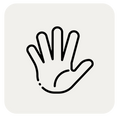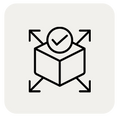From the time we enter the workforce, it’s impressed upon us that we have to leave our personal lives at home. But what about the reverse? Today, the real challenge is leaving our work where it belongs. With the understanding that time off is necessary to properly engage the parasympathetic nervous system, how do we truly switch off?
Create a “closing time” routine.

If you’re extra busy - or flat-out addicted to your work - it’s good to begin by winding down gradually. In doing this, we’ll be taking steps toward leaving work behind, so the mindset we were in all day seems further behind us.
Clearly, this routine will vary depending on your industry and schedule, but here are a few ideas. Begin closing out your workday by creating a to-do list for tomorrow. That way, we know the tasks we have yet to accomplish are not for today.
Another good step to take is to clean up your workspace. You can make your desk neater or clean any tools you use for your job. If you, like many others, have trouble avoiding emails, set an auto-response message that tells others you’re done for the day and will reply the next business day.
Make an appointment.

Some are more likely to leave the workday behind if they can immerse themselves in a totally different environment. The “appointment” you make for the end of the workday makes it less likely that you’ll linger behind and can be very beneficial for altering your mindset quickly.
For instance, you might want to sign yourself up for a yoga class directly after work. Or, you can schedule regular meetups for neighborhood walks with a friend or even some quality time with your kids.
The bottom line is if we feel as though we have somewhere else to be that’s important, we won’t be as tempted to finish one more task. And hopefully, that scheduled activity is relaxing!
An end-of-day meditation.

Speaking of relaxing, we can think of no better way to unwind than with a brief meditation. In fact, you can log off and get this done right at your desk, ready to leave and commence with a peaceful evening before you even step out of the door.
Sit upright, with shoulders relaxed. Close your eyes and begin tracking your breath as you inhale and exhale, progressively slowing down and drawing out each breath. Now you can introduce a mantra, or begin visualizing a calming scenario far removed from your job.
When you’re through, go ahead and strike your singing bowl three times. After all, much of their historical purpose was as a transition sound. We can still benefit from its intended use, training our brains to recognize the sound as a signal that our work is done.
In so many surveys conducted by all types of institutions, the majority of those asked report feeling stressed or overworked. How do you avoid overwhelm? Do you find it difficult not to bring work home with you? Share in the comments - we love hearing from you.






Leave a comment